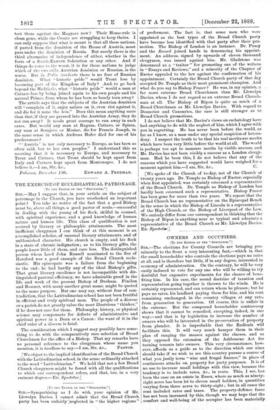THE EXERCISE OF ECCLESIASTICAL PATRONAGE.
[To THE EDITOR OF THE "SPECTATOR."] SIR,—May I suggest that, in your article on the subject of patronage in the Church, you have overlooked an important point ? You take no notice of the fact that a good Bishop must be, above all things, a good pastor of souls,—successful in dealing with the young of his flock, skilful in counsel, With spiritual experience, and a good knowledge of human nature and human life. This class of qualification is not secured by literary or philosophic attainments. The most inefficient clergyman I can think of at this moment is an accomplished scholar, of unusual literary attainments, and of unblemished character. His church is empty, and his flock in a state of chronic indignation ; as to his literary gifts, the people know little of them, and care less. The distinguished person whom Lord John Russell nominated to the See of Hereford was a good example of the Broad Church eccle- siastic. His episcopate was a failure from the beginning to the end; he had hardly any of the ideal Bishop's gifts. That great literary excellence is not incompatible with dis- tinguished pastoral efficiency, we have admirable proof in the life and work of the present Bishop of Durham. Fenelon and Bossuet, with many another great name, might be quoted to the same purpose. But one may say, without fear of con- tradiction, that the Latitudinarian school has not been fruitful in efficient and truly spiritual men. The people of a diocese or a parish do not greatly value the most illustrious "thinker," if he does not care for them. Philosophy, history, or physical science may compensate for defects of administrative and spiritual power in a Dean or a Canon : the want of it in the chief ruler of a diocese is fatal.
The consideration which I suggest may possibly have some- thing to do with the comparatively rare selection of Broad Churchmen for the office of a Bishop. That my remarks have no personal reference to the clergyman whose name you
mention, it is needless to say.—I am, Sir, &c., PASTOR.
[We object to the implied identification of the Broad Church with the Latitudinarian school, in the sense ordinarily attached to the word "Latitudinarian." We hold that not a few Broad Church clergymen might be found with all the qualifications to which our correspondent refers, and that, too, in a very eminent degree.—En. Spectator.]










































 Previous page
Previous page